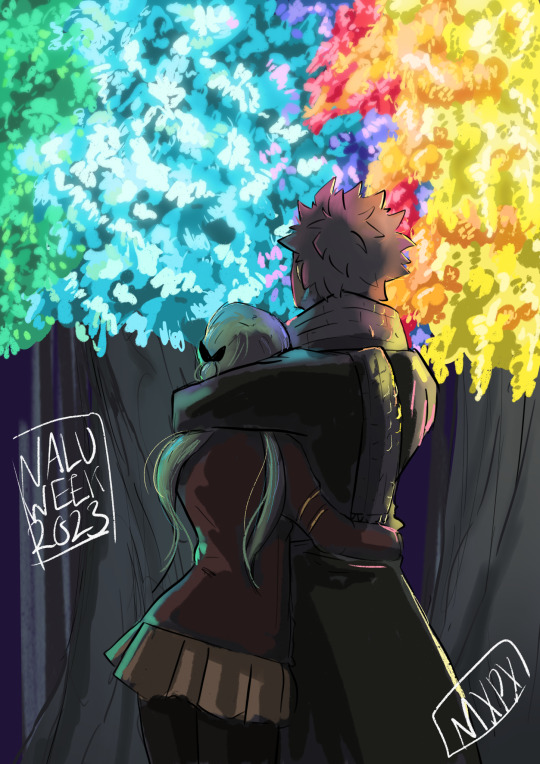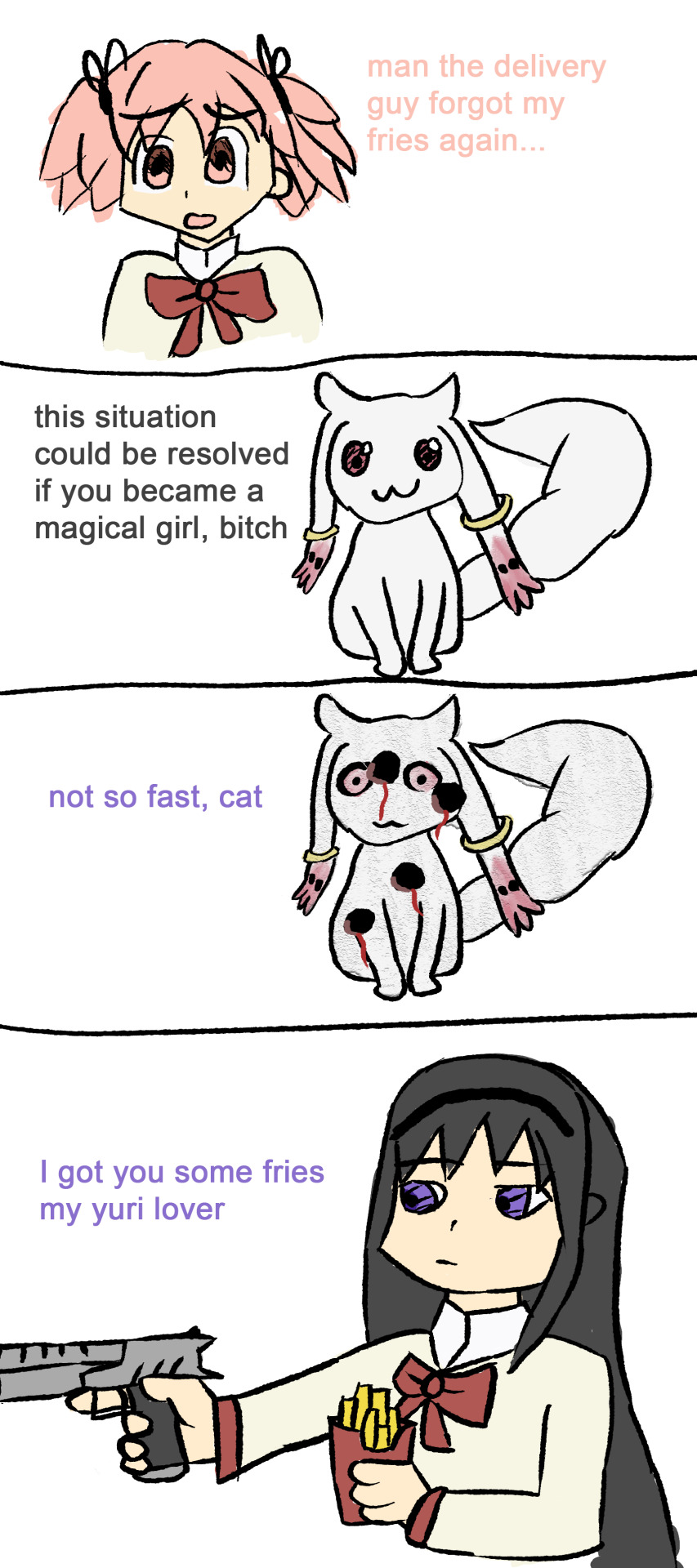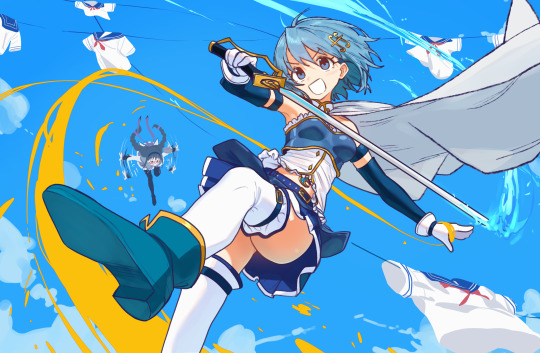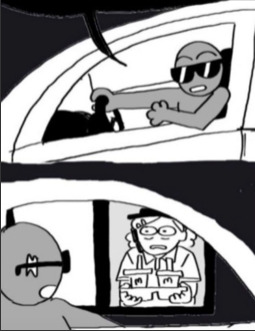"If it's for you, I don't mind being trapped in this endless maze for all eternity"
Don't wanna be here? Send us removal request.
Text
This is still like the absolute cutest Kyohru panel

485 notes
·
View notes
Text
I can't believe there are people who watched a story with a central theme about the power of love and kindness and got mad at the same principle being applied to the main antagonist, who in a way has had it even worse than her victims bc she never had anyone see her as just a person until Tohru offered to be her friend
I also can't believe that they saw her clearly take a step in the right direction through her expressions of remorse and ordering the Cat’s Room to be destroyed and just completely disregarded it, as if things turning out to be alright for her automatically equals injustice for her victims when in reality what she will go on to do moving forward is the exact opposite of injustice, as if her experiencing the consequences of her own actions in Season 3 wasn't enough to satisfy their sadistic desire to see “bad” people get punished bc her suffering didn’t last forever, as if impermanence means insignificance
13 notes
·
View notes
Text

Nalu Week Day 1 Anniversary
842 notes
·
View notes
Text
Fairy Tail: More Than Just "Cringe"—Why It Deserves More Love
Wanted to write this since I saw a bunch of people hating on fairy tail and then I found out they didn't even get past like chapter 5 lmao.
Fairy Tail is one of those manga that people either passionately love or loudly criticize. Over the years, it's been called "cringey," overly cheesy, and full of predictable power-ups. But here's the thing—those very qualities are what make Fairy Tail such a special series.
Sure, the story leans heavily on themes of friendship and unwavering bonds, sometimes to an exaggerated level. But isn't that part of the charm? Fairy Tail isn't trying to be a hyper-complex, morally grey epic. It's a celebration of the things that make shonen manga exciting: emotional battles, epic team-ups, and characters that genuinely care for one another. The fights may not always be strategic masterpieces, but they carry emotional weight that resonates with fans.
The world-building, from Magnolia to Tenrou Island, is rich and vibrant. The guild system creates a sense of community that makes readers feel like they're part of something bigger.
And the characters? Love them or hate them, there's no denying they have distinct personalities that make them memorable. Natsu’s fiery determination, Erza’s unshakable strength, Lucy’s growth from a hopeful newbie to a formidable wizard—all of it contributes to a heartfelt journey. Each major character has depth beyond their initial introductions, with clear motivations and evolving dynamics over time. And when it comes to romance, the series takes a refreshingly natural approach. Instead of forcing pairings for the sake of fan service, the ships in Fairy Tail feel earned. Relationships like Gajeel and Levy, Juvia and Gray, Jellal and Erza, or even Natsu and Lucy (while left ambiguous) develop organically through their shared experiences. These bonds don’t appear overnight—they’re nurtured through challenges, victories, and personal growth, making them feel real and meaningful.
Yes, Fairy Tail has flaws. The power of friendship can sometimes feel like a Deus Ex Machina. But is that really such a terrible thing? Plenty of series rely on power boosts for their protagonists—Fairy Tail just embraces the emotional aspect more. And honestly, in a world full of cynicism, a story that reminds us of the power of loyalty and bonds is refreshing.
So before dismissing Fairy Tail as just another "cringe" anime, take a step back and appreciate it for what it is—a fun, emotional, and wildly entertaining adventure that isn't afraid to wear its heart on its sleeve. Sometimes, that’s exactly what we need.
55 notes
·
View notes
Text
Was there any moment in the story where Kusuo was hurt by his dad physically or emotionally??? Because if so I feel like people on Tumblr would’ve highlighted it
#this is why I can’t take the idea of kuniharu being abusive seriously#like I’ve seen the “evidence” and it’s just stuff that no one in the story cares about#so why were people so angry about it#saiki k#saiki kusuo#saiki kuniharu#abuse mention#character hate mention
1 note
·
View note
Text


Redrawing an official art from the manga
184 notes
·
View notes
Text

22K notes
·
View notes
Text

60fps sakuga
988 notes
·
View notes
Text
Teruhashi is not a bad person just because she’s arrogant. She grew up being worshipped like a literal goddess and she knows her worth (she’s also like 16 guys she’s allowed to act a little immature) she expects men to fall in love with her automatically because they DO. To her, it’s basic human nature. Naturally she expects Saiki to do the same. And as she gets to know him she realizes that’s not the case with him.
Saiki has also said yes to “dates” with her on multiple occasions. they’re also in the same social circle. I think that’s good enough reason for her to still have hope he might return her affections some day, especially since he hasn’t explicitly said or implied that he doesn’t like her. And for a girl who’s almost never been rejected in her life, maybe she’s more oblivious to signs of disinterest (that’s just my guess)
Saiki’s attempts at getting rid of her crush on him are discreet so as to avoid attention, there is no ‘hint’ for her to take because he doesn’t give her any other than ignoring her. And he ignores everyone. She could believe that that’s just the way he always acts.
It’s ok to dislike or hate characters. But some of her haters just seem so bitter? Like, chill. She has her own faults but I can’t remember her doing anything unforgivable. Some of her haters are so quick to call her a bitch or a stalker or creep or whatever even when characters like toritsuka or mugami exist in the show, and I don’t get where all the heat is coming from. Do y’all really hate her that much?? For what??? Being confident? Having a crush on the wrong boy?
100 notes
·
View notes
Text
Thoughts about Kumagoro Saiki
Saiki's grandpa is a character I kind of change my opinion about a lot, and I feel like different parts of the fandom talk about him very differently so I wanted to try and articulate my own thoughts about him. I already feel like that one meme of the guy oversharing in the MacDonald's drive through but anyway let's get into it.
I always found the Tsundere Grandpa chapters really funny, but at the same time they made me uncomfortable. He's there to make fun of the Tsundere trope, and because of this he's often compared to a teenage girl with a crush when he's talking about his grandsons -- and that ends up feeling a bit odd.


Now, do I think he was intended to read as a pedo? Absolutely not! His weird thoughts are there as a silly thing to poke fun at a trope. But when you have lines like "I want to touch him more!!" and moments like this --

I can't help but think "...huh??"
Because that IS a weird way to think about your grandkids. And when people can look at the above screenshot and still not know where the idea that he's a creep comes from then I seriously wonder if we watched the same thing.
However, as someone who has struggled with intrusive thoughts before I really don't want to judge someone based on the worst things that pass through their head, even if they're a fictional character and even if those things are a bit... not right.
If we look at Kumagoro's actions, and his intentions, he really isn't a creepy man. He doesn't really cross any boundaries with his family -- in fact he actively avoids showing them any affection at all. It actually makes me wonder if part of his Tsundere-ism is him overcompensating for having these kinds of thoughts -- if he has the mindset that affection is something to be ashamed of then he's gonna avoid showing it, and in turn his affectionate thoughts are probably going to become more weird and unhinged, because he already thinks it's something wrong to feel.
The fact is that a LOT of people have incredibly weird thoughts. That's part of what Saiki deals with, isn't it? He has unfiltered access to everyone's brains, and often struggles with the idea that they're all awful because they're always thinking about awful things. But they're not all awful people, they're just people. It's like with Teruhashi, we start off thinking that her "true nature" is mean and arrogant because that's what Saiki sees in her thoughts, but then we realise that her actions matter more, and on the outside she always chooses to be kind.
Anyway it annoys me when people deny that there is anything remotely weird about Kumagoro's thoughts because like. there is. But it also doesn't feel quite right to call him a pedo because he doesn't ever actually do anything, and nor does he ever show any intention to.

#I was just confused by the creepy implications of his behavior#like what was the reason for that if you’re not gonna do anything about it#saiki k#saiki kumagoro#pedophilia mention#incest mention
17 notes
·
View notes
Text
Anime onlies: WhERe iS RiTsU???
Ritsu for the remainder of the series:

#when I first watched fruits basket I kept wondering when they were gonna appear again#I was so confused by their insignificance#so I was not surprised to learn that the author regretted this#fruits basket#ritsu sohma#gif
94 notes
·
View notes
Text
the cultural relativism of retributive justice, or: the argument against incarcerating akito
to go off aswati’s post, i think the idea of sending akito to prison for domestic abuse is an american solution to a japanese problem. akito being incarcerated not only does not work with the political narrative takaya is trying to push about rehabilitative justice, it also falls apart when you look at japan’s attitude towards domestic violence and incarceration as a whole. i believe the argument that akito should be incarcerated is projecting an american ideal of justice (a neoliberal, pro-prison industrial complex one at that) onto a story that does not concern itself with american, or even western, culture whatsoever.
in america incarceration is extremely common, but the same is not true of japan. according to prisonstudies.org, 639 out of 100,000 americans were incarcerated in 2018 (source) compared to 38 out of 100,000 japanese (source). the japanese justice system is not like the american justice system whatsoever, and mass incarceration is not part of contemporary japanese culture (compare 184 japanese establishment/institutions to 4,455 american with a population difference of around 2 million).
it should be noted that japan did not have a federal anti-domestic violence law until april 2001 (act 31), compared to america’s 1994 (violence against women act). this is significant as fruits basket takes place between 1999-2001, so domestic spousal violence was not federally criminalized until after fb takes place. note that this applies to spouses only, so it’s possible akito couldn’t even be held to these laws as akito is unmarried.
these laws may exist, but according to the diplomat,
Mainstream attitudes toward household violence traditionally treated it as an invisible issue that simply did not exist. Kanoko Kamata, an associate researcher at the Japan-U.S. program of Harvard University, says the problem went blatantly disregarded.
Kamata said law enforcement was reluctant to interfere in household affairs as it was typically believed that marital problems were not worth bothering about.
But Kamata said the real issue is that under the current law domestic violence is not treated as a crime but rather a civil code. (source)
in the united states, the mainstream attitude towards sending abusers to prison is a positive one, but as we can see that is not the case in japan. domestic abuse is viewed as not just a family affair but a cultural norm, and law enforcement is hesitant to interfere, even being discouraged to do so. in contrast to american culture, the sphere of japanese family culturally exists separately from the law. this would go doubly so for the sohmas, a large, wealthy, and influential family who undoubtedly has connections to the police.
with regards to child abuse, japan has had a child welfare act in place since 1947 that was supplemented by the child abuse protection act of 2000 (source). however, laws don’t supersede culture and children’s rights are an issue in japan. according to reuters,
Despite rights enshrined in child welfare law, children in Japan have no independent advocate or representation, unlike other developed countries such as Britain and the United States, leaving their well-being in the hands of welfare workers. (source)
let’s take a look at the culture’s attitude towards bullying to ascertain views on children experiencing abuse in general. according to hirotaka abe of the npo youth guardian,
We obtain objective evidence…that bullying is clearly happening…but sometimes, even if we show them clear evidence, they take no action or even try to conceal it. Some local administrations, all the people there, including city council members, conspire with each other. (source)
according to kayoko kurihara of the npo step,
After somebody reported [the child abuse], the police go there. But in many cases, they just give a warning and leave soon. (source)
like with domestic violence, there is evidence of a very hands-off approach from authorities and law enforcement when it comes to child abuse as well, whether that abuse comes from peers or parents.
when it comes to solutions, let’s look at step again. step is an npo that supports victims of abuse, but they also meet with the abusers themselves and address the root of their problem (often abuse in their own childhood) and help them reform and potentially mend their relationship with their child. kurihara also states, with regards to reformation, “…those who don’t learn will never change,” a strong argument against retributive justice.
according to satoshi brojan, a child abuse victim and advocate,
When child abuse happen[s], we just blame the abuser. But in the big picture, we have so many people who are mentally exhausted and [don’t] have support from anyone. In my eyes, children are paying the price for that in this country. We do need to work on the actual cause of the problem. We gotta recognize that this is a serious social issue for Japan. (source)
both kurihara and brojan’s points are reflective of the commentary takaya is making about justice in fruits basket: abusers are often victims themselves, there are larger social issues at play when it comes to abuse, and that reformation is achievable if the person is willing to change. incarceration is not used the same way in japan as it is america, and law enforcement is largely disconnected from the sphere of family life. takaya’s commentary on familial abuse and justice is a uniquely japanese one informed by factors unique to her culture, some of which directly contradict western ideals of tit-for-tat justice. therefore, the argument that akito should be put on trial and convicted of a crime is not only unrealistic within the japanese world of fruits basket, it is a result of western projection onto a starkly different culture.
145 notes
·
View notes
Text
You know when Lucy literally throws herself out of a window to escape a kidnapping because she heard Natsu's voice and she was sure he would save her? And then Natsu himself tells her that that was crazy? This is what makes the Nalu brainrot settle in.
415 notes
·
View notes
Photo





Happy 07.07! I’ve wanted to draw these for like 2 years but kept missing the date lol 😂
#fairy tail#natsu dragneel#igneel#gajeel redfox#metalicana#wendy marvell#grandeeney#rogue cheney#skiadrum#sting eucliffe#weisslogia
1K notes
·
View notes
Text
It’s been years and I’m still not over Lucy convincing the Spirit King to change his own laws just to save Loke’s life like what was I meant to do after that? Be normal?
152 notes
·
View notes
Photo

Catchin’ Air
Even after all these years I still love them!!!
4K notes
·
View notes
Text
shame we didn’t get to see kusuke see kusuos cat form
29 notes
·
View notes